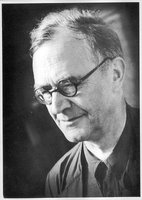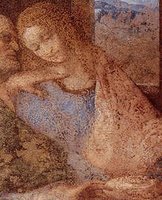

As a Wesleyan studying systematic theology at Princeton, I am often asked why I am here. Particularly, my interest in Karl Barth seems peculiar to both my fellow Wesleyans and my Princeton colleagues. Honestly, I have been asking myself for years how these two worlds might congeal. So, here is the first installment of a non-consecutive three-to-five part series on what Wesleyans (or at least this Wesleyan) can learn from Karl Barth.
What Wesleyans Can Learn from Karl Barth
Part One: The Threefold Word of God and the Wesleyan Quadrilateral
Both those within and without the Wesleyan tradition are familiar with the so-called Wesleyan Quadrilateral: Scripture, Tradition, Reason and Experience. The Quad was first lifted up by Albert Outler as a description of Wesley's eclectic use of sources and norms in his theology. From its inception, it was used as more than just a historical description of Wesley; it was offered as a normative method for establishing doctrine and guiding life.
As a method, the Quad has fallen on perennial hard times. Despite its initial attraction as a mediating and inclusive method, it unfortunately raises more questions than provides answers. How are these four entities to be related? Does one rule over the others? Are they sources or are they norms? Does the Quad affirm Sola Scriptura in any meaningful sense? Is there an ordering principle? All of these questions deserve answers, but this last one is particularly interesting to me. It comes up often when I have presented the Quad to others for the first time. Since I do not want to give up on the Quadrilateral entirely, I have long searched for a satisfactory understanding of the ordering of the four corners.
Enter Karl Barth. Barth's presentation of authority in theology is different than Wesley-via-Outler. Instead of a Quadrilateral, Karl Barth speaks of the threefold Word of God. There is one Word of God spoken to us and on which theology reflects. This one word of God can be found in three forms: (1) the incarnate Word, Jesus Christ, (2) the written Word of the Bible, (3) the proclaimed Word of Christian preaching through the centuries up to and including today. At the most basic level, this is just a linguistic insight into the three things which are referred to by Christians as the "word of God." But at a deeper level, Barth has found a way to affirm Sola Scriptura in a complex manner so that the lordship of Jesus Christ himself over even his Scriptural witnesses while at the same time the Bible is not set aside but re-established on the sure ground of the incarnate Word of God. The living Lordship of Jesus means also that he continues to call witnesses today. So all three (Jesus Christ, the Bible, and the proclamation of the church in word and deed), are the one Word of God, differentiated, united, and in proper order. So theology is not concerned with one thing, two things, or four things, but attends to the one threefold Word of God in all its unity and richness.

I think Barth's Threefold Word of God can embrace the best insights of the Wesleyan Quadrilateral while at the same time helping it to answer the question of an ordering principle. The ordered, differentiated unity of the Threefold Word of God includes the eclecticism of the Wesleyan Quadrilateral without the usual confusion. First of all, the center would remain firm as the incarnate Word, Jesus Christ. Secondly, the written Word of Scripture can be rightly placed in the second ring in close proximity to Christ yet under his authority. Next, the proclaimed word of God through history (tradition) and today (experience) forms the third ring. Note that I am adjusting Barth's language (though not necessarily his substance) in ordered to include Wesley's "experimental Christianity" or "practical divinity", treating the lives of believers as a testimony to Jesus Christ's living Lordship. This embrace of the Quadrilateral within the Threefold Word of God presents the authorities in an ordered unity that affirms a complex approach to theology yet anticipates the question of priority.

Finally, one might note a conspicuously absent member of the Quadrilateral from this diagram: reason. Now, I am no irrationalist. I love to think clearly and rationally. But reason, sorry to say, is not really something you have, but something you use. It is not "there" like the God-human Jesus, or the text of Scripture, or the Church's proclamation in word and deed. So I have not left reason out as much as redefined it as something that is in play at any moment of theological reflection on the threefold Word of God. Once again, I am taking my cue here from Karl Barth. While on his first and only lecture tour of American, Karl Barth was asked by a young University of Chicago graduate student, "What is the status of reason in your theology?" Barth replied, "I use it."
Any Thoughts?
Is the Threefold Word of God a compelling presentation of theological authority?
Does it really help solve some of the problems inherent in the Quadrilateral?
Does it ruin something you like about the Quad?
Have you had any additional misgivings about the Quadrilateral?
Could the threefold Word of God help these matters too?


